 All the hostages killed during the 12-hour siege by Islamic State terrorists were foreigners, with most being Italian or Japanese.
All the hostages killed during the 12-hour siege by Islamic State terrorists were foreigners, with most being Italian or Japanese.
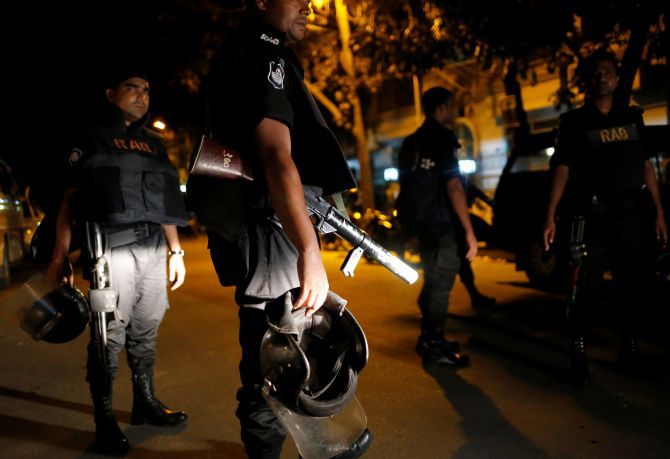
Twenty foreigners, including an Indian girl, were hacked to death by suspected ISIS terrorists inside a cafe popular with expats in Dhaka's diplomatic zone in the worst terror attack in Bangladesh before commandos launched an assault on Saturday, June 2, killing six attackers and capturing one alive.
Director of Military Operations Brigadier General Nayeem Ashfaq Chowdhury said the terrorists slaughtered 20 hostages before the joint operation led by the armed forces began. Most of those killed were found with their throats slit, he added.
Tarishi Jain, 19, who was taken hostage, was killed by the attackers. 'I am extremely pained to share that the terrorists have killed Tarishi, an Indian girl who was taken hostage in the terror attack in Dhaka,' External Affairs Minister Sushma Swaraj tweeted.
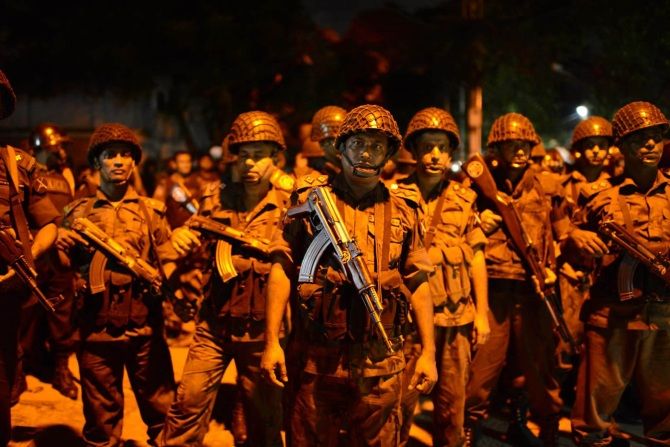
Italian and Japanese nationals were among the 19 others brutally murdered by the terrorists. Two senior police officers were also killed in the gunbattle that began on Friday night.
The bodies of the victims were recovered during a search in the Holey Artisan Bakery compound after the operation, Chowdhury said. The bodies were shifted to the Combined Military Hospital morgue for autopsy to confirm their identities.
"Army Para commando Unit-1 led the operation and killed six terrorists within 13 minutes," Chowdhury told reporters.
The mission codenamed 'Operation Thunderbolt' was launched after Prime Minister Sheikh Hasina ordered the army to intervene to end the hostage crisis, he said.
Gunshots and sounds of explosions rocked the area at 7:40 am local time as security forces launched the assault to end the siege.

Minutes later, Sheikh Hasina announced the end of the siege and said security forces had 'successfully' wrapped up the operation, freeing 13 hostages after killing six terrorists and capturing one terrorist at the cafe.
'It was an extremely heinous act. What kind of Muslims are these people? They don't have any religion,' she said in a televised speech, referring to the terrorists.
'They (the terrorists) defied the call of Ramadan's tarabi (special evening) prayers and went to kill people... The way they killed people is intolerable. They don't have any religion...terrorism is their religion,' Sheikh Hasina said with army chief General Abu Belal Muhammad Shafiul Huq by her side.
'I thank Allah as we could destroy the terrorists and rescue the hostages,' Sheikh Hasina said, adding that 'none of the terrorists could flee the scene, six of them were killed on the spot and one was captured alive.'
Sheikh Hasina vowed to do everything to 'uproot the terrorists and violent extremists' from Bangladesh.
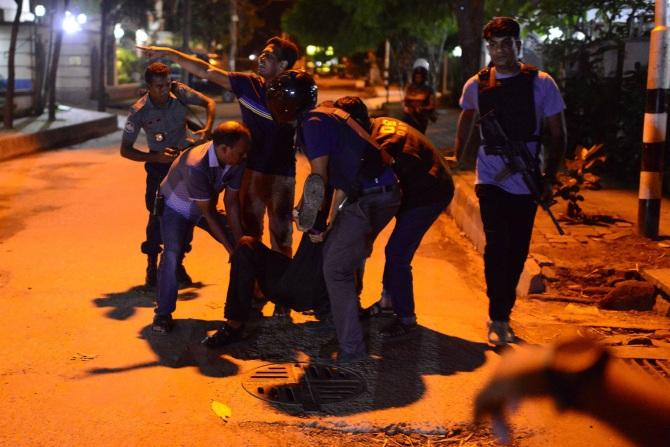
Among those rescued were Indian, Sri Lankan and Japanese nationals, media reports said.
Around 30 people were injured in the attack, Sheikh Hasina said.
Islamic State claimed responsibility for the attack through its Amaq news agency, nearly four hours after the hostage crisis unfolded, according to the US-based SITE Intelligence group, which monitors jihadist activity online.
The agency issued a number of photographs of what it said were scenes from inside the restaurant. The pictures showed what appeared to be a number of bodies lying in pools of blood.
Amaq claimed that 24 people had been killed in the attack carried out by what it described as 'ISIS commandos.'
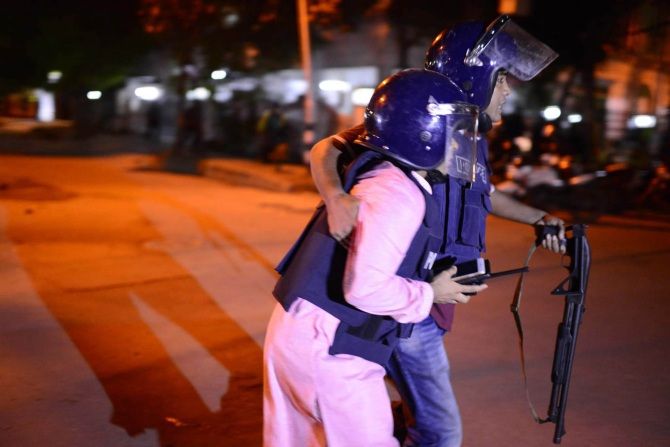
Heavy firing and explosions continued for at least for an hour after the operation began on Saturday morning. A resident of a building, just 50 yards from the scene, reported spotting snipers firing from their guns.
Shots were also fired from armoured personnel carriers. Grenades were also apparently exploded. Later, the APCs broke through the walls and entered the restaurant premises.
After hours of quiet at the Holey Artisan Bakery where terrorists held the hostages, a fresh round of heavy gunfire rang out in the morning.
'Our law enforcement agencies responded promptly soon after the terrorists raided the restaurant... as they were about to take action, two police officers were killed by the terrorists,' Sheikh Hasina said.

The situation prompted the government to summon army commandos from cantonments in north-eastern Sylhet, suburban Savar and the Dhaka garrison overnight, the prime minister said.
'At around 4 in the morning, the operational plan was laid out and the security forces launched the assault,' she said.
Soldiers in armoured personnel carriers moved in with commandos. Over 1,000 rounds of gunshots were fired and almost 100 blasts were heard in the first half an hour of the raid, media reports said.
On Friday night, terrorists shouting 'Allahu Akbar' barged into the cafe, frequented by diplomats and expatriates, and opened indiscriminate fire at around 9:20 pm local time.

The military-led rescue operation was launched jointly by a navy commando squad, paramilitary BGB, elite anti-crime RAB along with special police units.
The deceased policemen have been identified as officer in-charge of the nearby Banani police station, Salahuddin Ahmed, and Additional Commissioner of Police Rabiul.
An Argentine national and a local escaped after taking refuge in a nearby house when the terrorists entered the restaurant.
The police have detained two employees of the cafe for questioning.
Muslim-majority Bangladesh has witnessed a wave of deadly attacks on religious minorities and secular bloggers by suspected Islamist terrorists.
A 48-year-old Hindu priest was on Saturday stabbed and critically injured in Satkhira district. A Hindu priest and a Buddhist leader were brutally hacked to death by machete-wielding ISIS terrorists in the last two days while another Hindu man survived a bid on his life.
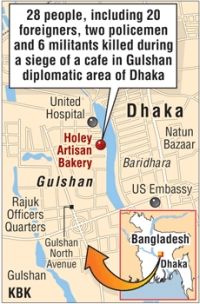 A well thought out media strategy
A well thought out media strategy
According to Rukmini Callimachi, The New York Times correspondent who focuses on Al Qaeda and ISIS, the Bangladesh attack claimed by ISIS is 'proving to be more sophisticated in terms of pre-planning than we have seen in the past.'
According to Callimachi, 'in keeping with the modus operandi pushed last year by Abdelhamid Abaaoud, planner of the Paris attack, the assailants in Bangladesh created a hostage standoff. The purpose of a hostage standoff was to extend length of operation & thus extend the press coverage, as well as a chance to make demands.'
'It now appears images of bodies lying in pools of blood next to bakery's ratan chairs were photographed by assailants and sent back to the IS. They may have tried to do this during the November 13 attack on Bataclan concert hall in Paris. Witnesses saw suicide bombers trying to get online,' she said on Twitter.
While asserting that social media had now made even the smaller, regional acts very effective in spreading the message of terror, Callimachi said: 'Survivors (in Paris) reported that suicide bombers seized their phones; tried to surf the net, but the 3G network was out. Two witnesses saw a bomber whip out a laptop. But they did not succeed in getting images out.'
'But in Dhaka, they not only got images out but also details of the operation (turns out they were right when they said 20 people were killed). The information they fed out went straight to ISIS' core media operation, appearing in close to real time on ISIS' Amaq News Agency. One other aspect of planning: Like Paris attackers, they left behind images of themselves preattack. In this case posing next to IS flag'










